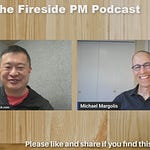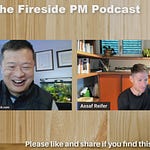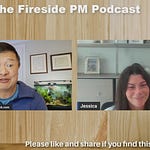I recently had a fascinating conversation with Rodolfo, a Senior Product Manager at Spotify and a good friend from my days mentoring at Harvard Business School. Rodolfo shared a powerful insight into nailing product management interviews, particularly valuable for anyone early to mid-career in Silicon Valley or looking to break into tech. His experience underscores something I frequently coach my own clients about: how you think is more important than what you think.
When Rodolfo shared a LinkedIn post and Substack article detailing an interview hack he'd discovered, I knew it was too good to keep to ourselves. Here, I’ll break down the core idea, share key quotes from Rodolfo, and offer actionable advice on applying his insights in your career journey.
Rodolfo’s Journey to Product Management
Rodolfo’s path into product management wasn't a straight line. He started in consulting and quickly realized it wasn't his passion. His first real taste of tech came through an operations role at Facebook, which eventually opened his eyes to product management:
“Working closely with PMs at Facebook opened my eyes. I started taking on PM tasks and growing into the role by shadowing and volunteering for extra work—essentially making my own PM apprenticeship.”
This proactive approach served him well. He transitioned to a PM role at Reddit, pursued an MBA at Harvard, and later joined Cameo to develop deeper business and product skills. Today, Rodolfo leads a zero-to-one team at Spotify, building new user acquisition products—his “dream job,” given his passion for music.
Why Product Management?
When I asked Rodolfo why he ultimately chose PM, his reasons were relatable:
"As someone who thrives on ambiguity and enjoys navigating people, product management was a perfect match. I love switching contexts throughout the day—engineering, design, business strategy—it’s never repetitive."
This diversity is appealing, but he cautions:
“Don't jump into PM just because it's the hot thing. You need a hypothesis about why you're doing it, and then actively test it. Intern, volunteer, create something yourself—don’t wait for an official onboarding path.”
This mirrors my experience advising aspiring PMs: those who wait for structured training or perfect circumstances often miss out. The role itself demands proactive initiative and the courage to make things happen.
The Interviewing Breakthrough: Clarity of Thought
Rodolfo described his early struggles with PM interviews. Despite feeling competent in day-to-day product work, he often stumbled when interviewing because he focused too much on frameworks and getting the "right answer." His breakthrough came during an interview practice with a friend, who bluntly told him:
“I’m having trouble following your thought process. Can you explain your steps more clearly?”
That simple feedback was Rodolfo’s "aha moment." He realized the key to acing interviews isn't necessarily arriving at the perfect solution immediately but clearly articulating the reasoning behind each step of your process.
The PM Interview Hack: Communicate Your Thinking
Here's Rodolfo’s hack for improving PM interview outcomes:
1. State your assumptions clearly:
“I’m assuming Disney Parks and Resorts wants me to focus on enhancing physical experiences rather than digital-only products. Does this align with your expectations?”
2. Articulate each step of your process explicitly:
“I’ve identified that Disney has underutilized assets after closing hours. This might represent untapped revenue opportunities. Let’s explore that.”
3. Check in frequently:
“Does this approach make sense? Are these user segments resonating with you?”
3. Self-correct visibly:
If you sense misalignment, pause and say, “I think I might be veering off course. Can you clarify if I’m addressing your question directly?”
This practice accomplishes two critical objectives:
Ensures the interviewer understands your logic and communication style.
Demonstrates your adaptability, a vital skill for PMs dealing with ambiguity.
Real-World Application
Rodolfo emphasized this isn’t just an interview technique; it’s foundational to successful PM work:
“If someone can't follow your thought process in an interview, they won’t follow it at work. Being clear in your thinking is essential to rallying cross-functional teams, convincing stakeholders, and leading effectively.”
Indeed, clear communication can differentiate you significantly, especially as your career progresses into roles requiring greater alignment, influence, and strategic clarity.
Interviewing Mindset Matters
Your mindset during interviews matters tremendously. If you approach it like a high-stakes test, anxiety and rigidity often sabotage performance. Rodolfo and I agreed that treating interviews more like collaborative working sessions makes candidates more successful. As I frequently advise:
“Treat your PM interview as a collaborative workshop, not a final exam. Engage your interviewer as if they're a colleague you're collaborating with to solve interesting problems.”
Three Quick Actionable Tips for PM Interview Prep:
1. Practice transparent thinking:
Simulate interviews by verbalizing your reasoning aloud at every step.
2. Ask clarifying questions proactively:
This demonstrates confidence and ensures alignment throughout the interview.
3. Research your target companies deeply:
Demonstrating specific knowledge about recent company initiatives or competitors shows genuine interest and sets you apart.
Quotes to Remember:
“Nailing an interview is more about the how than the what.”
“If someone can course correct during an interview, it almost makes them a better hire than someone who had the right answer from the start.”
“You get promoted as a PM not just because of results but because of how you achieve those results.”
Final Thoughts
Rodolfo’s insights highlight the foundational importance of clear thinking and communication, essential skills for anyone aspiring to grow in product management. Embracing these practices can dramatically shift your interviewing—and career—trajectory. Subscribe to Rodolfo’s substack here.
Keep Growing Your Product Career
If you found this conversation helpful and want to dive deeper, I offer personalized 1:1 coaching specifically tailored for product management professionals. You can find out more and book sessions at tomleungcoaching.com.
Additionally, if your organization needs support with product strategy, hiring talented PMs, or PM onboarding and training, visit paloaltofoundry.com to learn about my product management consulting services.
OK, now let’s get back to work!












